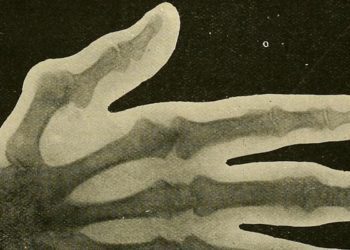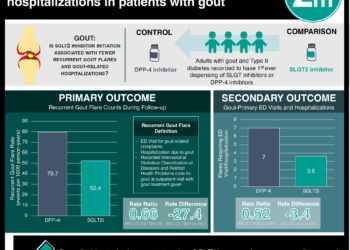Quick Take: Efficacy and cost-effectiveness of nurse-led care involving education and engagement of patients and a treat-to-target urate-lowering strategy versus usual care for gout
Gout is the most common inflammatory-type arthritis worldwide, resulting from the presence of intra-articular sodium urate crystals. In addition to painful gout attacks, resulting inflammation can result in joint damage and subcutaneous nodules. Crucial to lowering a patient’s risk of experiencing recurrent attacks are urate-lowering strategies, through both pharmacotherapy and behavioural modification (i.e. weight management, reducing alcohol intake and dietary intake of purines and fructose). Practically, however, gout management in primary care has long been regarded as suboptimal, with less than half of patients receiving urate-lowering therapy. In patients receiving urate-lowering therapy, adherence is often poor, with the dose received being typically fixed without titration to achieve a target serum urate concentration. This is likely the result of misconceptions surrounding the disease (i.e. it is not a serious condition) and a lack of patient education.
In this randomized controlled trial, 517 patients who had experienced a gout flare in the previous 12 months were randomized to receive nurse-led care, where individualized information was provided and patients were engaged in shared decision-making, or to continue with usual care. The aim of this study was to compare the efficacy of this nurse-led intervention in gout management when compared to usual care over a 2-year period. Based on multiple imputation, researchers found that after 2 years of follow-up, 95% of patients in the intervention group achieved serum urate concentrations <360 umol/L, compared to 30% in the usual care group (RR 3.18, 95% CI 2.42 to 4.18). Concentrations <300 umol/L at 2 years were seen in 88% of patients in the intervention group, compared to 17% in the usual care group (p<0.0001). In addition, 96% of patients in the intervention group were using urate-lowering therapy at 2 years, compared to 56% of patients in the usual care group, with the most commonly used agent being allopurinol. The mean dose at 2 years in the intervention group was 460 mg/day as compared to 230 mg/day in those receiving usual care. Gout flare frequency reduced gradually from baseline to 2 years in both groups (p<0.0001). Interestingly, the risk of having two or more flares per year was higher in the nurse-led group than in the usual-care group at 1 year, however, this number was considerably reduced after 2 years. This study therefore shows that gout management can be significantly improved with the addition of nurse-led, individualized, patient education and patient engagement in shared decision-making around care.
Click to read the study in The Lancet
Image: PD
©2018 2 Minute Medicine, Inc. All rights reserved. No works may be reproduced without expressed written consent from 2 Minute Medicine, Inc. Inquire about licensing here. No article should be construed as medical advice and is not intended as such by the authors or by 2 Minute Medicine, Inc.






